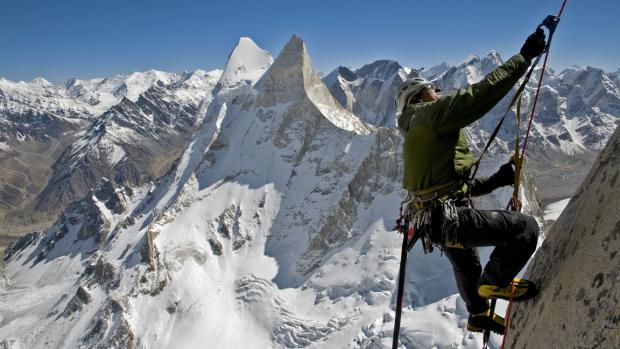Film review: MERU
Mount Everest? It’s for pussies, says writer-mountineer Jon Krakauer.
OK, he doesn’t actually use that word, but it’s kind of the attitude he takes when comparing it to Mount Meru, in northern India. Specifically, he’s talking about the peak known as the “Shark’s Fin,” 1500 feet of flawless granite that has sent some of the best climbers in the world packing. You can hire Sherpas to carry the packs and take most of the risks on Everest, Krakauer notes. But scaling the shark, you’re on your own.
That the documentary Meru, about the first successful team to climb the peak, hits theaters a week before the much-ballyhooed (but not to be press previewed) Everest is, of course, only coincidental. Still, the battle lines are drawn, and a documentary like this, filmed almost entirely by two members of the team, offers a lot that a fictional film can only fake.
Krakauer, author of Into the Wild and Into Thin Air, wasn’t a participant. He’s here as a talking head to pull together interviews with climbers Conrad Anker, Jimmy Chin and Renan Ozturk, who we first see on an unsuccessful attempt to climb Meru in 2008.
That first climb, which takes up the first half of the film, is so grueling that you can’t believe they were eager to take another shot at it. Just to get to the base of the peak requires climbing 4000 feet with a heavy load of supplies: scaling the Fin itself may take six or seven days. It calls on every technical skill in the climber’s repertoire.
What makes the second climb even more astonishing is what the team goes through in between attempts. One member nearly dies in an avalanche. Another suffers a severe head injury that isn’t fully healed by the time the second attempt begins.
That in-between period of the film also delves into the personalities of the climbers, just in time to answer the question on the minds of everyone in the audience: What kind of nutcases would do this to themselves? They come across as surprisingly well-balanced and capable men, which of course makes their conscious willingness to test death all the more puzzling. (This is not a movie that will make parents say, Gee, I’d like my kids to look into mountain climbing as a career.)
The area where a fictional film like Everest wins out is the ability to re-create the impressive disaster scenes that no real cameraman in his right mind would shoot, at least not if he expected to live. If you’re looking for that kind of excitement, you may find the finale of this documentary a bit anticlimactic. But then, you know going in that these guys are going to succeed. What makes the movie so compelling is its revelations of what it cost them to get there. Now playing at the Amherst Theater.

